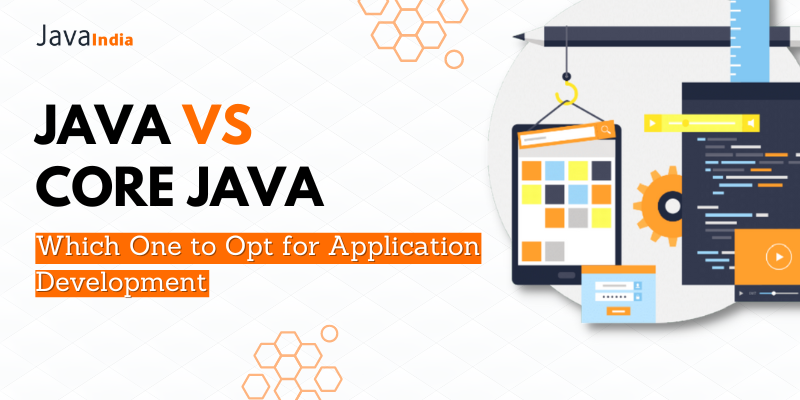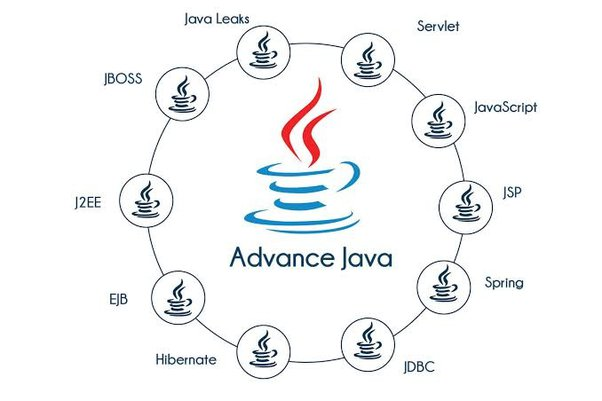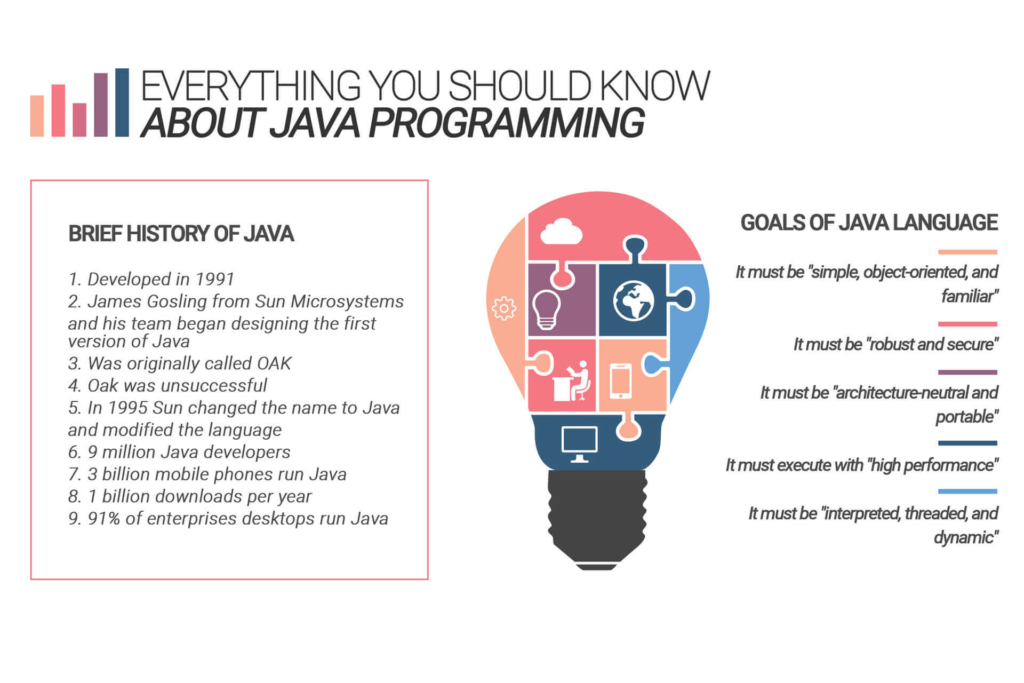
Java Vs Core Java: Which One to Opt for Application Development
Java is a general-purpose, high-level programming language built with object-oriented programming concepts derived from C and C++. Compared to its older iterations, Java has fewer implementation dependencies.
It is a computing platform used to develop applications created by Sun Microsystems, which was later purchased by Oracle Corporation. The phrase Core Java is not an officially defined term, but was coined by Sun Microsystems to refer to Java SE.
This is the foundational version of Java, which provides an expansive library of general and specialized APIs. It is called Standard Edition because it was the basis of the subsequent editions of Java. This article discusses the difference between Java and Core Java to assist in making informed decisions.
What is Java?
Java is ubiquitous, thanks to its straightforwardness and intuitiveness. It is found everywhere, from gaming consoles and mobile applications to websites; and web applications, Java powers millions of devices and serves as a fundamental programming language.
Native Android apps are also written in Java, and a multitude of businesses leverage Java for server-side scripting for their backend services. It’s efficient and reliable nature make it an ideal choice for various projects and websites. Thus, solidifying its slogan “Write once, run anywhere”.
Since it’s inception, Java has emerged as a powerful cross-platform language. Furthermore, due to its excellent security features and its ability to be compiled and; executed on any platform with a Java Virtual Machine, it is a popular choice among enterprise Chat Applications.

Developers prefer Java for its dependability and remarkable features, thus making it one of the most commonly used programming languages. Because Java is fast and secure, it is required for many applications and websites. What began as an Internet language has evolved into one of the most versatile cross-platform programming languages ever created.
Java applications are typically compiled to bytecode and a bytecode can be executed on any platform having a Java Virtual Machine. Many enterprises prefer Chat Applications in Java in comparison to other languages. The remarkable security and its innovative features is why developers prefer Java over other programming languages.
What is Core Java?
Sun Microsystems classifies Core Java as the basic version of the Java programming language, acting as the cornerstone for its other Java related technologies, such as CORBA and Java VM. Core Java is more than just the programming language itself, but rather a compilation of various libraries.
This form of Java is utilized for building basic desktop applications, with its set of general and specialized APIs falling under the umbrella of Java SE technologies. In simpler terms, Core Java is the basic subset of Java SE.
Java provides comprehensive features based on its comprehensive understanding of the language. It provides a comprehensive program which covers the OOP concepts, specific operators, data types, wrapper classes, queues, and exception handling.
There are three Java-based platforms available, with Java SE being the most popular choice among Java Development Companies. This platform features general purpose APIs, various development tools, a virtual machine, and multiple class libraries.

Java vs Core Java: A Comparison Table
| Core Java | Java | |
| Definition | Fundamental and standard Java version providing cornerstone iteration/editions/features of Java. | Class-based programming language enabling object-oriented program development. |
| Editions | J2SE | J2SE, J2EE, and J2ME |
| Correlations | It is Java Subset | It is superset of Core Java |
| Network Usage | Incompetent to reduce network usage due to poor RestFul API | Capable of reducing network usage for cost cutting |
| Embedded System Usage | It can’t enable app creation for embedded systems or mobile devices. | It can enable mapping on embedded systems |
| Applications | It enables seamless desktop and server-based application development like J2EE, WebLogic, JBoss Enteprises Application development framework and more. | It makes applets and application development seamless for mobile phones, tablets, Blue-ray players, televisions, and more. You can create Java-based application for any of these. |
Java Vs Core Java: Features to Leverage
Java Features to Leverage
- Object-Oriented Programming:
Java is an object-oriented language, which means that it is based on the concept of objects, which represent real-world entities. It provides the facility to create objects and manipulate them.
- Platform Independent:
Java is a platform-independent language which means that it can be run on any machine regardless of the architecture of the underlying operating system. This makes it easier for developers to port their applications from one machine to another without any compatibility issues.
Java has built-in security features such as authentication and access control. It also has support for a secure socket layer (SSL) which allows secure communication between clients and servers.
- Memory Management:
Java provides an efficient way to manage memory by using garbage collection to reclaim unused memory. This ensures that the application does not run out of memory and leads to improved performance.
- Rich APIs:
Java comes with a rich set of APIs that provide access to various libraries and frameworks. These APIs allow developers to easily access and use a variety of features, making it easier to develop applications quickly.
As it supports multi-threading, Java allows multiple tasks to be run simultaneously. This allows developers to create more responsive applications by taking advantage of multi-core processors.
Features Of Core Java:
• Platform Independence:
This programming language is known for its platform independence as it enables the user to ‘write once and run anywhere’. This is the major feature that allows the user to develop programs that can run on any platform, regardless of the system architecture or operating system.
• Robust and Secure:
Core Java ensures secure coding by providing strong memory management and exception handling. It also eliminates the problems of memory leakage by automatically reclaiming unused memory.
• Object Oriented:
Core java provides basic concept such as inheritance, abstraction, encapsulation, polymorphism, and many more which helps in writing robust programs.
It supports multi-threading that allows running multiple tasks simultaneously. This feature makes the application more efficient and responsive.
• Dynamic Memory Allocation:
Core Java supports dynamic memory allocation that allows the programmer to allocate and deallocate memory dynamically. This helps in increasing the efficiency of the program.
• Support for Networking:
Altogether, it provides support for networking. This helps in developing applications such as chat applications, distributed applications, etc.
All of these features are enticing for both a Java development company or developer to speed up innovation in this area. So, if you are thinking out loud to create a solution you can leverage any of them to fit your need.

Java Vs Core Java Basics
- Java is a high-level, object-oriented programming language that utilizes the syntax of both C and C++.
- Additionally, Core Java is a specialized application of Java. Altogether, it is used to build code that can be ported between desktop computers and server networks.
Java Vs Core Java: Packages
- Java includes a wide range of packages such as Lang, Java, awt, Javax, and more.
- Core Java only enables single packages called Java.lang.
Java Vs Coe Java: Learning Curve
- If you want to learn Java, you only need to know the basics. It means any beginner can learn quite easily.
- For learning core Java, you just need to know concepts like object-oriented programming, polymorphism, multi-threading, and others.
Java Vs Core Java: Platform
- Java is an inherently cross-platform language, specifically designed with fewer implementation dependencies than most other programming languages.
- Core Java is an operating environment used to create Java applications for desktop and server computers alike.
Java Vs Core Java: Application
- Being a strong and self-sufficient platform, it is an ideal option for creating applications for various platforms such as phones, embedded systems, and servers.
- Core Java, which is also referred to as Java Standard Edition (Java SE). Moreover, it provides the groundwork for the Java platform and is used for constructing enterprise-level applications, ranging from desktops to servers.
Java Vs Core Java: Level
- As an ideal language for starting a programming journey, Java provides an understanding of Java SE fundamentals.
- Core Java covers a variety of topics such as object-oriented programming, threading, polymorphism, and exception handling. Thus, it offers a thorough grounding in core Java development.
Java Vs Core Java: Which One to Leverage?
As it is hard to tell which one is best for businesses to leverage, it is apparent that they come with a wide-range of features specific to solutions. Suppose, if you want to create an application for mobile, web, tab, and more. You should opt for Java, as it comes with advanced features and APIs.
Moreover, if you want to create a desktop or server application, you should of for Core Java. Moreover, make sure to hire java developers with the precise framework, APIs, and tool expertise.
Wrapping Up:
Comparing Java and Core Java yields no difference, as the latter is simply an integral component of the former. The distinction between the two, however, lies in the fact that Core Java is more detailed, combining several other programs.
The Java language is the foundation for various computing platforms, and Core Java is one such platform that consists of development tools such as the virtual machine. Initially starting as a simple language, Java eventually developed into a cross-platform language, prompting enterprises to hire Java developers in order to build secure, engaging and scalable web applications.
Frequently Asked Questions
1. What is Java and core Java?
Developing applets and applications relies on Java, but Core Java specifically focuses on designing application software for both desktop and server configurations. It’s the most basic, and pristine, form of Java, laying the groundwork for other editions of the language.
2. Where is core Java used?
Core Java delves into the fundamentals of the Java language, while Advance Java focuses on its more complex topics. Core Java is predominantly utilized in the development of computing and desktop applications, while Advance Java is best suited for crafting enterprise applications.
3. What pricing model you follow?
We provide pricing models as per your project requirements:
- Dedicated Hiring
- On an Hourly Basis
- Fixed Hiring
4. Do you sign NDA with your developers?
Before beginning our conversation, we have our developers sign a non-disclosure agreement (NDA) in order to guarantee that their activities are kept private. Consequently, our recruiters are able to offer the highest degree of confidentiality.
5. Is core Java basic Java?
Core Java is the fundamental concept underlying Java-like variables, data types, arrays, OOPS, and so on. Here you will find an overview of all of the core Java concepts. Core Java is typically included in the Java SE edition, which allows you to create general Java applications.
6. What is the best Java and core Java?
Core Java encompasses a range of essential components like variables, data types, and object-oriented programming. This concept forms the foundation of Java and is available with Java SE edition, providing the capability to develop all sorts of Java applications.

